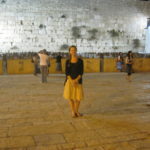Fighting for Religious Rights with Women of the Wall
As I approached the Zion Gate, the threshold in Jerusalem’s fortifications leading to the Kotel (Western Wall), I had mixed emotions. Over the past 13 years, since I first stepped foot in front of its vast expanse, this place has transformed in my imagination from a shrine of deep religious significance to a place of oppression. Ingrained in me was the notion that the Kotel was sacred to all Jews, but the more I approached this holy site, the less sacred it felt. Over the years, a shrinking women’s section, an inability to use my voice in prayer, and an overwhelming feeling that my Judaism and brand of yiddishkeit were not accepted here have led me to think of this spot not as one of liberation and connection, but as one of oppression.
I’ve been disheartened by the news coming from Israel, highlighting how far women and progressive Judaism have to go here. The reports of women literally having to sit on the back of the bus, men spitting on women and girls due to their clothing, and the prevailing law that allows police to arrest women at the Kotel wearing tallitot (
But with all this, I am torn. I made a conscious choice not to live in Israel. I wonder if this struggle for women’s rights and religious freedom is my own. Do I have a right to join the resistance? I was taught at a young age that Israel is my homeland, a concept that I bought into with all my heart and soul. But that notion was challenged ten years ago, as I prepared with my fellow Israeli and American program participants to enter and work in a Russian Jewish community.
I made a conscious choice not to live in Israel.
During one group discussion on Israeli society and politics, a fellow Israeli participant challenged the expression of Americans’ connection to Israel. She, struggling with non-Israelis in the room using the word “we” to describe Israel, remarked that most non-Israelis in the room might feel a connection to Israel, but we neither fought for the state nor had family or friends die while serving this country. Non-Israelis—even Jews – didn’t have the right to be part of the Israeli “we.” This conversation caused a deep internal struggle for me – was she right? What does it mean to be an American Jew in relation to Israel? What right do I have to question, criticize, or in the case of the women’s rights and religious pluralism, fight?
While I have a deep love and an evolving relationship with Israel, I feel a sense of distance from the country. These competing ideas were on my mind as I approached the Kotel to daven with these incredible women. What I experienced brought me to tears in ways that I never would have anticipated.
I encountered a large circle of strong women (and some men standing nearby) who were fighting for the basic right of religious freedom. They were together, singing with voices high, praising God in joyous song, and yes, some courageous women wearing tallitot at the holiest site for Jews around the world. It was breathtaking. But for me, something was different: I’ve prayed with this group many times over the past thirteen years, at various stages in my life: as an undergraduate studying in Israel for the first time, as a graduate student contemplating aliyah, and now, as a woman expecting her first child this summer.
Today, I stood with Women of the Wall carrying the next generation.
Today, I stood with Women of the Wall carrying the next generation. I am carrying the potential for a new tomorrow — a child who should not only enter a world with fewer struggles, but a child who has the potential to help effect real change. The impact of this moment — participating with a group that is fighting for aspects of social justice that I hold so dear — felt monumental. In that moment, I realized the importance for their fight and my role in that effort. During Hallel we sang, “Min hametzar karatiya anani vamerchav ya” (From the narrow place I called to God. Answer me from the divine expanse) – in this place, with these people, it felt as though these words were coming directly from our hearts.
I still have not solved my internal struggle – this is one I anticipate I will have for a lifetime, no matter where I am. In the meantime, I will support these warriors in Israel, just as I know I need to with those battling for similar causes here at home. If nothing else, joining the Women of the Wall stirred a passion in me to use my voice in order to create change.
Fighting for Religious Rights with Women of the Wall was originally published in the Bnai Abraham Synagogue monthly bulletin.








